Common Problems and Troubleshooting
Experiencing issues? This section provides troubleshooting guidance for the following issues:
Installation and Update Issues
I think I need to update the MetaEd IDE
If you're having trouble with the MetaEd IDE, a good place to start is ensuring you have the latest version. If you're having issues, you may want to skim the MetaEd Release Notes to see if the problem you're experiencing is mentioned.
Typically, VS Code will auto-update the MetaEd IDE from time to time, as new versions are available. To check on the status, you can open the Extensions panel and search for MetaEd. There, you can see the currently installed version number.

If you suspect there is a newer version, but are having trouble getting Visual Studio Code to install the update, then you can view all available versions on the Visual Studio Marketplace and manually download a newer version. Install the manually downloaded version with the Install from VSIX command, as shown below.
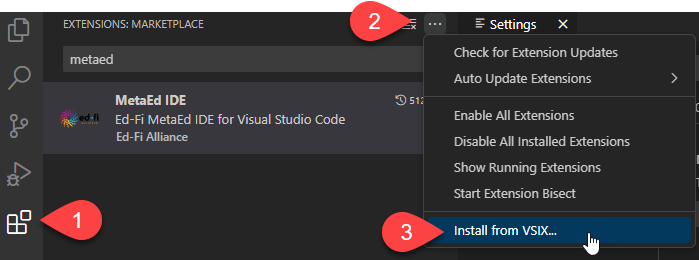
I want to fully uninstall MetaEd IDE
Open the extensions panel in VS Code, search for MetaEd, and click the Uninstall button. Optionally, uninstall VS Code.
I still see MetaEd controls in a non-MetaEd project
This is normal and should be harmless.
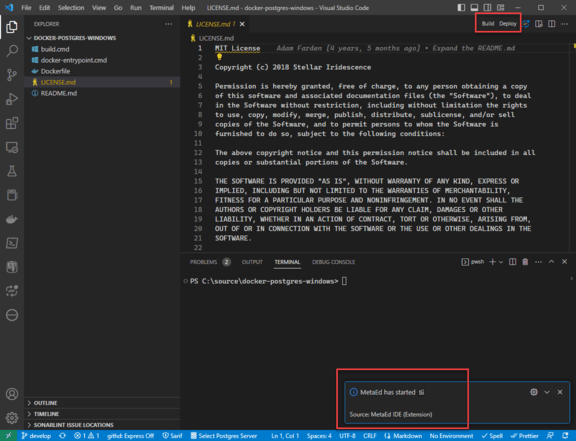
If you do not wish to see MetaEd on other folders, then please disable the extension until it is needed again. Open the list of extensions, find MetaEd, and disable it.
Error and Warning Issues
There is no syntax highlighting or error detection in my newly created file
Common causes:
-
Files must have the extension ".metaed" in the file name in order for MetaEd-IDE to provide syntax highlighting or error detection.
-
The project's
package.jsonmust be properly formatted, with exact casing for "metaEdProject", 'projectName", and "projectVersion"Good ✅
{
"metaEdProject": {
"projectName": "Sample",
"projectVersion": "1.0.0"
}
}Bad - lower case 'n' in "projectname" ❌
{
"metaEdProject": {
"projectname": "Sample",
"projectVersion": "1.0.0"
}
} -
MetaEd extension is disabled or not installed. Please open the Extension panel in VS Code, search for MetaEd, and check the status of the extension.
I receive an error message on a domain that suggests I can include a descriptor
The error pictured below seems to indicate that descriptors may be included in domain files, which is incorrect.
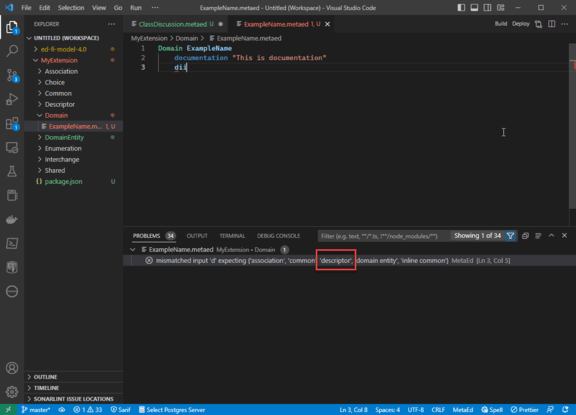
Descriptors cannot be included in domain files. The error message above may be corrected in a future release. The error message below provides the correct set of items that may be included in a domain file.
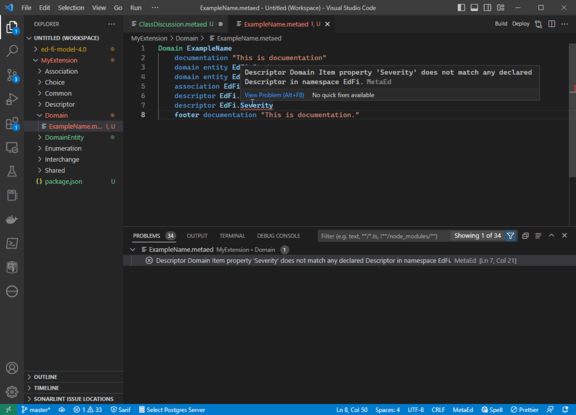
Note in the image above that no error is detected for the inclusion of the descriptor "Behavior". This is because "Behavior" is the name of both a descriptor and a common type in the core model. The linter ignores the keyword and validates based on the name of a valid common type.
I receive a warning: MetaEdId '3116' on Descriptor Property Term already exists on another entity
Detailed message:
warn: MetaEdId '3116' on Descriptor Property Term already exists on another entity. All MetaEdIds must be globally unique. C:\....\ed-fi-model-3.3b\Common\CohortYear.metaed (9:21)
warn: MetaEdId '3116' on Shared Decimal Property EarnedCredits already exists on another entity. All MetaEdIds must be globally unique. C:\....\ed-fi-model-3.3b\Common\PartialCourseTranscriptAwards.metaed (6:53)
The MetaEdIde is an optional feature, primarily used only by the Alliance. This warning indicates that a value was accidentally re-used in model 3.3b. This will not have any detrimental impact on an extension build and should be ignored.
File and Folder Issues
I moved a .metaed file to a new folder, but it keeps showing up in the old location
If a metaed file is open in the editor when a file is moved, the open tab will continue to point to the former location. If you save the open tab after the move, the editor will save a copy of the file in the former location. You may avoid this by closing the editor tab before moving the file or by closing the file without saving the changes after the file has been moved.
I renamed a .metaed file, but a duplicate keeps appearing with the old file name
If a metaed file is open in the editor when a file is moved, the open tab keeps the former path. If you save the open tab after renaming the file, the editor will save a copy of the file with the former name. You may avoid this by closing the editor tab before changing the file name or by closing the file without saving the changes after the file has been renamed.
Data Modeling Issues
I have a complex data model that requires multiple references to resolve to a single entity
A complex model can result in duplicate references flowing through the model.
Sometimes, your model may require that the references always be a merged
reference to a single entity, rather than multiple references to the same type
of entity with different roles. MetaEd can handle these complex modeling
scenarios by using the merge...with directive.
See the MetaEd Cookbook entry Using Merge Directives for details.
Build and Deploy Issues
My version of the ODS/API is not available in the preferences
As of March 22, 2024, the following versions are shown in the preferences for MetaEd. Older versions not displayed here are no longer supported. ODS/API 6.2 (released 3/21/24) can be accessed by choosing "6.1.0". This dropdown list is expected to be more generic by the time ODS/API 7.2 comes out, at which time it will likely simply "6" or "7" without the full version number.
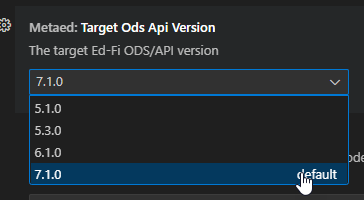
I clicked the button, and nothing happened
Open the Output panel and switch to the MetaEd view. Review the log to find a detailed error message. If this troubleshooting page does not describe the issue, please submit a support ticket in Ed-Fi Tracker with a copy of the error message and as much detail as you can provide about the conditions under which the error occurred.
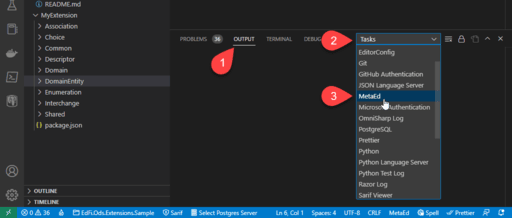
I tried to build or deploy and received an error message about needing a Data Standard project
Extension developers need to add both the desired model project and their extension in the Explorer pane, preferably in that order (if you add them in reverse order, then the MetaEd build output will be in the data molder folder instead of in your extension folder). If you forget to open the data standard project then you will get an error message like the one below when attempting to run either Build or Deploy. Note that the message gives you the local filesystem location of all of the data model versions that are bundled with the MetaEd IDE. You can highlight the folder name, copy it, and paste into the window when adding adding a folder to a workspace.
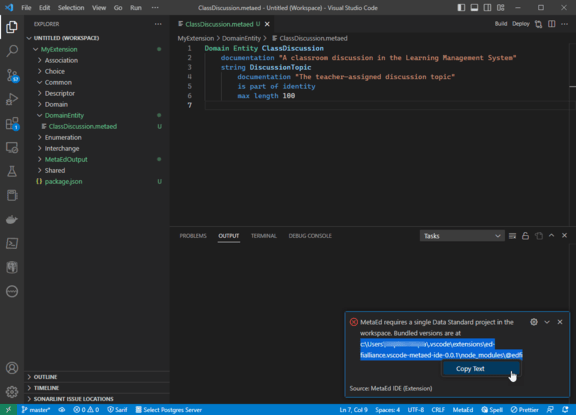
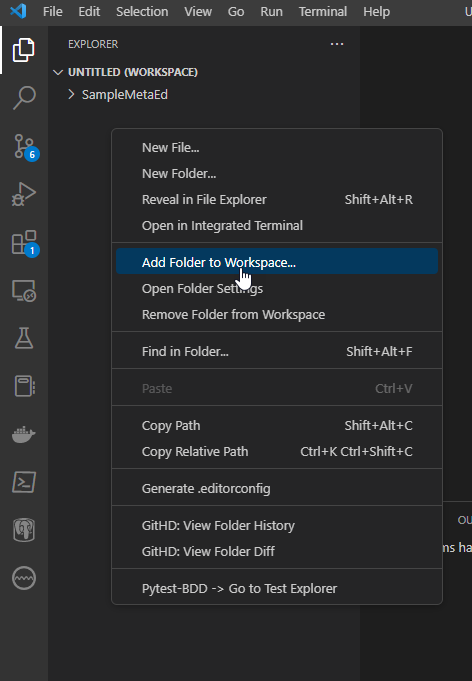
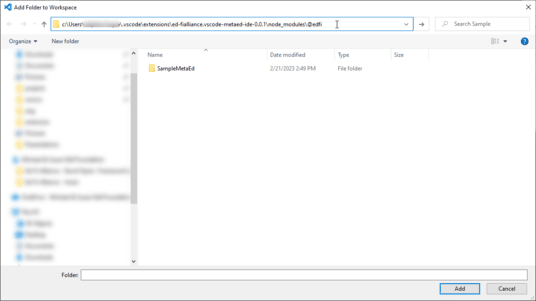
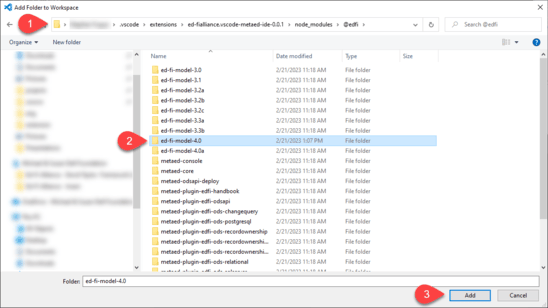
I added a Data Standard project and get an error message with the wrong ODS/API version
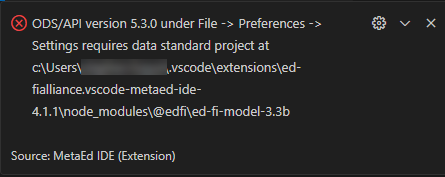
This occurs when MetaEd expects you to use one model version and you have loaded a different one in the explorer panel. And sometimes, you may think that you have loaded the correct matching version. You will need to check on the MetaEd settings - and make sure that you check both the user settings and the workspace settings. There is the possibility of having set an older (or newer) version in one location, and then changed it in the other location. In theory the user settings should override anything in workspace, but we have seen some inconsistency there, with workspace settings sometimes "winning". In general, we recommend only using the workspace settings.
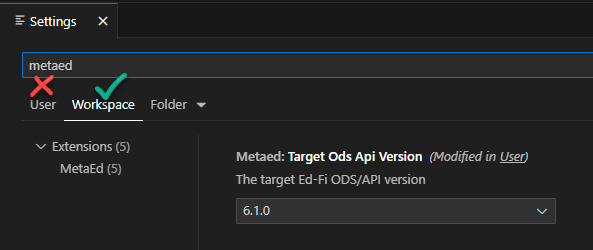
I tried to deploy, but received a message about checking the ODS/API path

There are two possible explanations:
-
The configured ODS/API directory root does not exist (setting: Ods Api Deployment Directory) or does not contain the
Ed-Fi-ODS-Implementationrepository. -
You have an extension data model, but do not have a C# extension project in
Ed-Fi-ODS-Implementation/Application. The output panel will show a message like this in such a case:
I ran a successful build, but re-running the build now results in an "Unable to delete output directory..." error
Unable to delete output directory at path "C:\...\MetaEdOutput\".
Please close any files or folders that may be open in other applications.
First, double-check that you do not have any of the MetaEd output files open in any other application. Antivirus protection software may place a file-lock on MetaEd output files preventing the MetaEd IDE from deleting the output from the previous build to replace with output from the new build. If all output files are closed and you still receive this error, you may need to update the settings on your antivirus protection to prevent the file-lock from occurring. Restarting your computer will also remove the file-lock and allow the IDE to delete and replace the output files.
I ran a build and received an error, but I can't tell if MetaEd IDE has completed the attempt
If an error is encountered during a build attempt, MetaEd IDE will not provide any other indication that the build attempt has completed other than a description of the error that caused the build to fail. The error message itself is an indication that the attempt has finished.
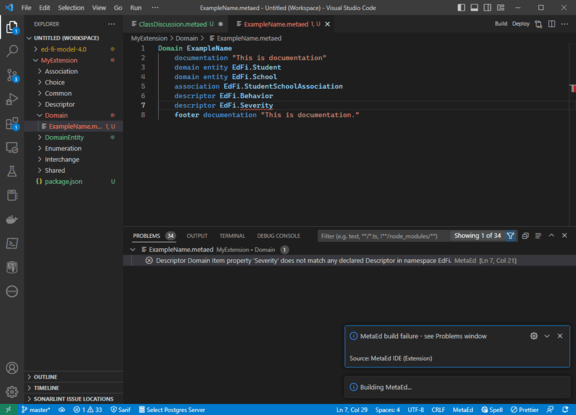
I sometimes receive the unhelpful error message "no viable alternative at input <EOF>" when working on the end of a file
This indicates there is a syntax error in the file but at that moment MetaEd cannot provide specific information on the error. This is because MetaEd doesn't have enough information to recover from the error, so the best it can do is indicate that one exists. Continue working on the file and MetaEd will be able to recover once there is more of the file for it to inspect.
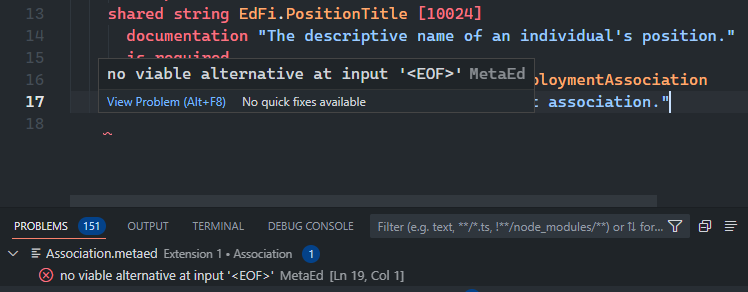
The Interchange XSD files generated by the build are invalid when opened in an XML editor
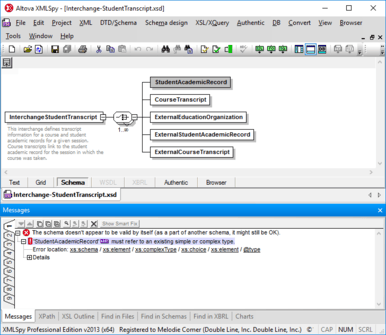
In order to assist with file organization, build artifacts are sorted into folders according to the type of artifact. However, the schema location specified in the generated interchange files expects the schema file to be in the same folder as the interchange files. Simply move either the schema file or the interchange files (or both) into the same folder.
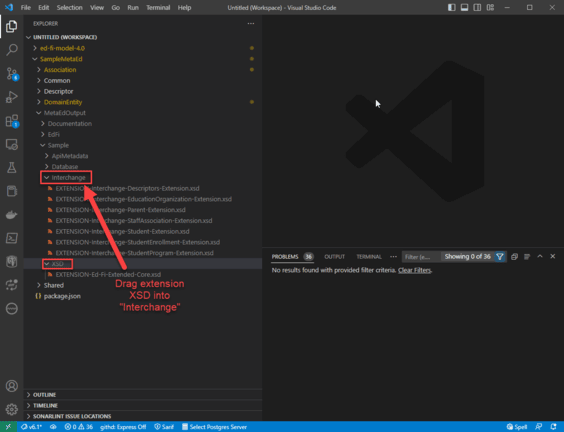
Your interchange files should now validate properly in an XML editor.
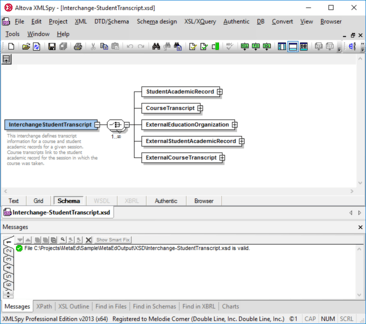
If you make additional changes and run the build again, all MetaEdOutput folders are deleted and replaced in their original locations. Therefore, to validate the interchange files in an XML editor after a new build, they will need to be manually moved again.
I received a message saying there are non-MetaEd projects in the workspace, and my extension did not build

In the original example of this error, the build process completed and there is
an output folder, but it did not contain any extension information. The problem
was traced back to the extension project's package.json , which was
accidentally saved as a UTF-16 file instead of
UTF-8.
Look at the bottom edge of the VS Code window to find the file format; in this screenshot you can see it as "UTF-16 LE".
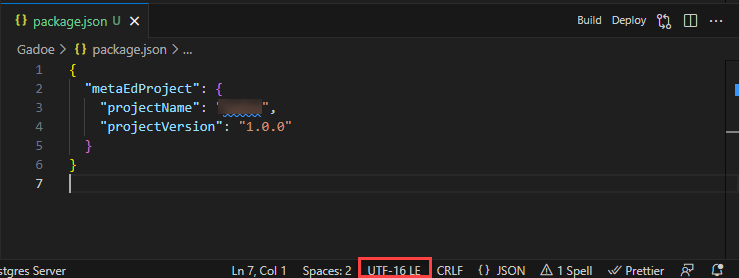
Click on that text to initiate saving in the correct format (UTF-8), as shown in these screenshots.
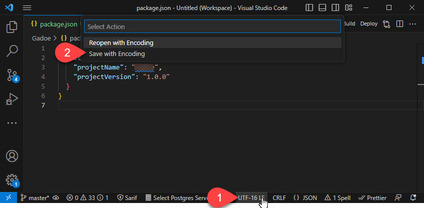
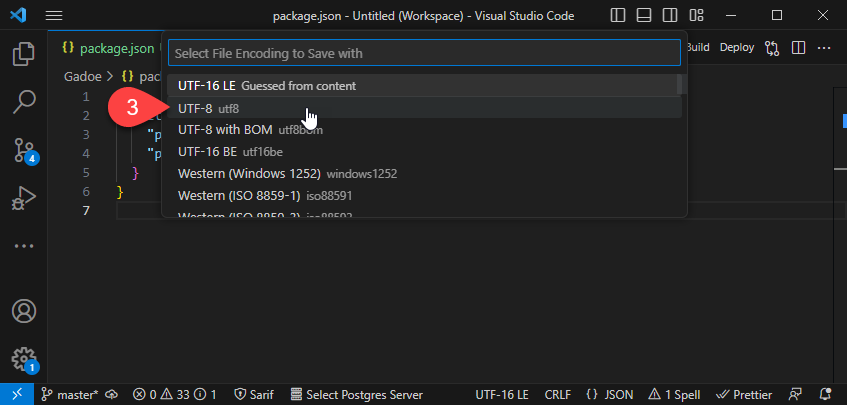
Additional Resources
I'd like to get in touch with a human about MetaEd
MetaEd questions, bugs, issues, and feature recommendations are tracked via http://success.ed-fi.org/. You can submit a ticket, and a human will get back with you.